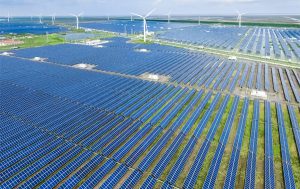News
Energy transition - challenges in the built environment
The energy transition is changing the sources we use to generate our energy. In addition, the role and position that parties in the energy sector will have in the future is also changing.

Energy transition in development
User demand is changing and digitalization is supporting the emergence of new business models. As a result, energy parties are searching for their position to be part of the transition. In this article, JBR presents its views on the developments in the energy sector and the significance for different types of players.
Society has largely accepted climate change as fact and is becoming aware of the necessary changes, creating support for the energy transition. Politicians are trying to shape the energy transition and push it through with subsidies and new legislation (rewards and punishments). However, this design lags behind the objectives and there are still many uncertainties. The goals from Europe are becoming more ambitious. The new U.S. president has also pledged his support for the Paris climate agreement. Corona has increased support for a more sustainable energy supply. However, end users and companies still have a wait-and-see attitude and are postponing their investments. The economic crisis following the pandemic will reinforce this wait-and-see attitude.

Solutions
The design is not yet entirely clear in some areas, but we are moving toward more climate-friendly (renewable) energy sources in the long term. While other European countries want to partially replace oil and coal with gas in the short term, the Netherlands wants to get rid of gas as soon as possible. This fixation has arisen mainly because of the earthquake damage in Groningen. Given the installed infrastructure and required capacities, however, it will be some time before we can completely do without gas. The question is, however, whether this black-and-white view of gas is justified at all. It is clear that the Netherlands must get rid of low-calorific gas from Groningen, but the more energy-efficient (and thus more environmentally friendly) high-calorific gas used in most other European countries has often been left out of this discussion. In most countries, this gas is considered a green intermediate transition station and expansion of gas networks is taking place.
A combination of wind and solar currently appears to be the foundation of a long-term solution. This electrification requires different infrastructure technology and adjustments in how (especially timing) we generate and consume energy. Because of the weather dependence of energy sources, energy storage solutions such as (green) hydrogen and batteries are becoming more important. Furthermore, cities are betting on heat networks and investigating how sources of waste heat (such as data center and waste incineration) can be connected to the network.
To reduce energy consumption, existing and new buildings are investing massively in insulation. The regulations and investments often do not consider the source that heats the buildings. The insulation standard and related investments of buildings connected to a residual heat network, which is climate neutral and does not require additional energy generation, could perhaps be used more efficiently.
The new energy sources bring challenges but also new opportunities. Solar panels in particular are ideally suited for off-grid and micro-grid concepts. These types of concepts are emerging in large numbers and variety in recent years. It reinforces the trend of decentralization. An essential tool for supporting this trend is digitization. Metering and control devices enable smart grids and platforms connecting micro-grids to large-scale networks. Control capacity and buffers enable better matching of supply and demand.
Role of JBR
For companies playing a role in the energy chain, it is sometimes difficult to choose a good place and an attractive revenue model within the chain. Several questions then arise. Should you focus or rather keep options open? Develop autonomously or grow through acquisitions. "Niche player or aim for economies of scale?
Contact us personally

Ronald van Rijn
Managing Partner JBR